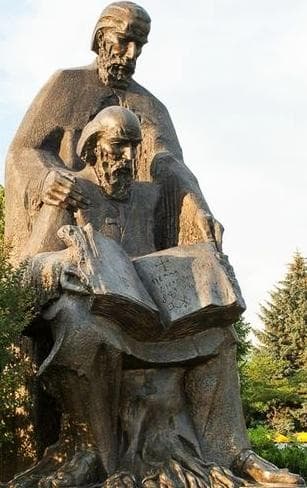Saint Cyril
Saint
Feast Day: February 14
Death: February 14, 869
Biography
Saint Cyril, also known as the Apostle of Bulgaria, the Apostle of the Slavs, the Apostle of the Southern Slavs, Constantin, Constantine the Philosopher, Constantine, Cyril the Philosopher, Equal of the Apostles, and Slavorum Apostoli, was born in 827 in Thessalonica, Greece. He was born into a Greek noble family that had connections to the senate of Thessalonica, and it is believed that his mother Maria may have had Slavic roots. Cyril received his education at the University of Constantinople, where he studied philosophy and later became a teacher of the subject. He was ordained as a deacon and eventually became a priest. He also served as a librarian at the church of Santa Sophia. In his pursuit of a deeper spiritual life, Cyril decided to become a monk and took on the name Cyril. In 861, Emperor Michael III sent Cyril and his brother Saint Methodius on a mission to convert the Jewish Khazars of Russia. This mission proved successful, and during their time among the Khazars, Cyril was able to learn their language. This experience would later be instrumental in their efforts to spread Christianity among the Slavic peoples. In 863, Cyril and Methodius were sent to Moravia with the mission of converting the people there in their native tongue. Their work faced opposition from some western clergy, who refused to ordain candidates for the priesthood that Cyril and Methodius had trained. However, despite the challenges, the brothers continued their work and made significant progress. One of Cyril's most notable contributions was the development of an alphabet for the Slavonic language, which later came to be known as the Cyrillic alphabet. The creation of this alphabet was a crucial step in making scripture and liturgical texts accessible to the Slavic nations. Initially, there was criticism concerning the use of this alphabet, but Cyril and Methodius persisted, and eventually, their efforts gained approval for the Liturgy to be celebrated in the Slavonic language. It is believed that Cyril may have been appointed as a bishop, but there is uncertainty regarding whether he died before or after the consecration ceremony. Cyril passed away on 14 February 869 in Rome, Italy, due to natural causes. Throughout his life, Saint Cyril demonstrated a deep commitment to spreading the Gospel and promoting Christian unity. His work played a significant role in the conversion of the Slavic peoples and the growth of the Church in Eastern Europe. In recognition of his contributions and holiness, Cyril was canonized as a saint, although the exact date of his canonization is prior to the period when formal canonizations were conducted. Saint Cyril is often depicted alongside his brother Saint Methodius, and he is frequently represented as an Oriental monk holding a church with the help of Methodius. He is also depicted surrounded by Bulgarian converts and wearing a long philosopher's coat. Saint Cyril is venerated as the patron saint against storms, as well as the patron of converts, ecumenism, and Slavic peoples. He is also recognized as a patron saint of various regions and countries, including Bohemia, Bosnia, Bulgaria, Carinthia (Austria), Carniola, Circassia, Croatia, the Czech Republic, Czechoslovakia, Dacia, Dalmatia, Europe, Khazaria, Krain, Krajna, Kranjska, Macedonia, Moravia, Pannonia, Russia, Silesia, Slovenia, and Yugoslavia. Additionally, specific dioceses such as Ljubljana in Slovenia, Maribor in Slovenia, and Saints Cyril and Methodius in the diocese of Toronto, Ontario, honor his memory as their patron saint. Furthermore, in 1980, Pope John Paul II declared him a patron saint of Europe, emphasizing the importance of his work in fostering unity between the Eastern and Western Churches. Saint Cyril's feast days are celebrated on 14 February (formerly 7 July and 9 March), and he is specifically honored on 27 July as one of the Apostles of Bulgaria and on 6 April in Velehrad, Moravia. His legacy continues to inspire and guide believers, particularly those who seek to promote unity within the Christian faith.
